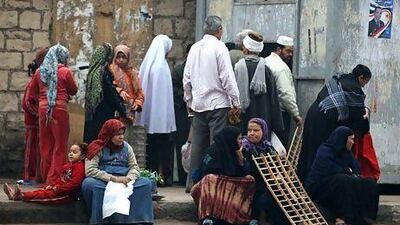CAIRO // Egypt's prime minister Kamal El Ganzouri could barely hold back the tears as he told journalists the country's economy was "worse than anyone could imagine".
Foreign reserves, crucial for propping up domestic currency, are down by half, the budget deficit has soared, the cost of borrowing is rising and foreign investment has collapsed.
Meanwhile, a turnaround in the Muslim Brotherhood's political fortunes has propelled the Islamist movement to the centre stage of economic policy, presenting its leaders with some tough decisions.
Political debate over the economy has focused on a proposed loan of US$3.2 billion (Dh11.75bn) from the IMF, which economists say is needed to close the fiscal deficit this year, but is unpopular with Egyptians. The loan has become a political football because the IMF lacks credibility among Egyptians, having been associated with the liberalisation policies of the regime of Hosni Mubarak, the ousted president, and everything that went with them, particularly corruption and inequality.
Officials from the Freedom and Justice Party, the political party that represents the Brotherhood, has criticised the proposed IMF loan, demanding it be discussed in parliament first and that certain conditions be met before a final decision is made.
The party, which has the largest number of seats in Egypt's first freely elected assembly, appears to be flexing its political muscle as it demands other alternatives are exhausted first.
"No one borrows money without checking what he has first and the other alternatives," said Ashraf Badr El Din, the head of the Freedom and Justice Party's economic committee. One option, he suggested, would be to increase export prices for Egypt's natural gas, which is sold via pipeline to Israel and Jordan and exported as liquefied natural gas to France and other countries. "Any decision taken needs to be of course within parliament before," he said, questioning the transparency of the loan including where the money would go and how it would be used.
Mr Badr El Din and other officials from the Freedom and Justice Party met representatives of a visiting IMF delegation in Cairo last month to initiate talks on the terms of the loan. The IMF said it wanted to meet all Egypt's political parties to ensure "broad political support" for any new programme.
Economists and analysts say time is working against the Muslim Brotherhood as it struggles to develop a credible economic policy.
"The more [the Freedom and Justice Party] find out how bad the fiscal situation is the more compelled they will be to accept the loan and enter tough negotiations as quickly as they can," said Mazen Hassan, a professor of electoral systems at Cairo University.
Foreign reserves have fallen to $18.1bn, just enough to cover two months of imports; the budget deficit has soared to 8.6 per cent of GDP; the cost of borrowing has jumped to 16 per cent for seven-year bonds; the balance of payments slumped to a $2.4bn deficit in the three months to September and foreign direct investment plummeted to $440.1m from $1.6bn a year earlier.
Although the party is insisting on talks in parliament, it is not clear how much power parliament has.
Under the old constitution, the government was obliged to refer certain treaties to parliament for approval, including any big loans from international lenders such as the IMF and World Bank.
Bruce Rutherford, a professor at Colgate University in New York and the author of Egypt After Mubarak, said the key to the Brotherhood's actions over the loan lay in the distribution of power between the ruling military council, the supreme council of armed forces (SCAF), and parliament.
"Legally, the SCAF is the only entity with the power of decision regarding the IMF loan," he said. "[However] politically the Brotherhood wants to assert the power of parliament and the need for the SCAF to transfer power to parliament and, in June, to the new president as soon as possible."
Although the Brotherhood is unlikely to "kill the loan", Mr Rutherford said it wanted "to assert clearly and firmly that the power to make such decisions should lie in the hands of civilian authorities".
Even as the debate rolls on, economists say the situation is getting worse and the money might be too little too late. Some expect the authorities to resort to a devaluation in the currency to help stabilise its foreign international reserves.
"Egypt will need at least double that amount or even an additional $6bn to $7bn if private capital does not return," said Said Hirsh, an economist at Capital Economics in London. "So, for now, a devaluation of the pound still seems likely."
"This could be done in an orderly manner with the help of the IMF and other donors, where the pound falls from its current rate of 6 Egyptian pounds to the dollar to around 7 pounds to the dollar. On the other hand, a disorderly devaluation could see the pound reach 8 pounds to the dollar or even worse," he added.
This would initially bring about some increase in inflation, but it would also encourage foreign investment back into the country, and reduce the drain on currency reserves.

